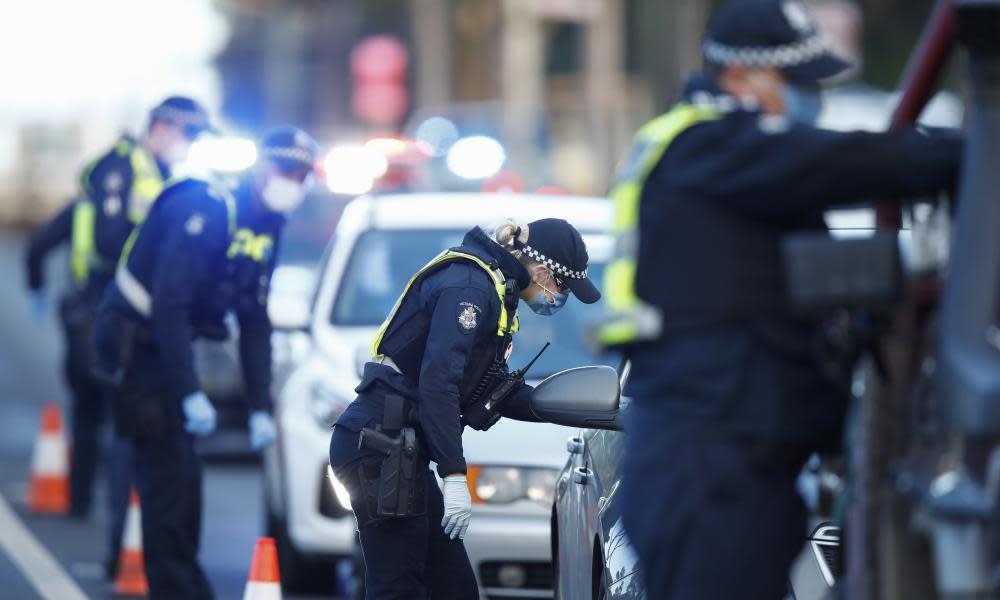Victoria police enforcement of Covid-19 lockdown risks harming vulnerable communities

For the first time in the Covid-19 pandemic, Victoria police are using number plate recognition to monitor and control community movements in suburbs under lockdown, in a move that has concerned those working with vulnerable, and culturally and linguistically diverse, communities.
Daniel Nguyễn, the advocacy coordinator of the Police Accountability Project, a public interest legal project that monitors human rights abuses by police and represents victims, said they were seeing an intensification of police resources to surveil lockdown postcodes including the deployment of public order units, mounted officers and remote drones.
“We are concerned that this militarisation and policing crackdown will disproportionately impact communities already weary of being targeted and exacerbate their sense of isolation during this lockdown,” Nguyễn told Guardian Australia.
“From the outset of the pandemic we have been concerned about the over reliance of policing to address a public health issue. We don’t know if the Victoria Police approach, which has seen more fines issued than every other state combined, has helped or hindered the community’s response to the virus. The government cannot continue to rely on policing as a response without any evidence it is actually being effective.
“We do know that policing can cause harm – fear, stress, anxiety, confusion and the disproportionate serving of fines on those least able to afford them can be devastating. Communities need information, support and an overall approach grounded in public health policy – not punishment.”
Speaking to reporters on Thursday, Victoria police chief commissioner Shane Patton made no apologies for the hardline stance from authorities in the 36 suburbs now under lockdown due to more than two weeks of new Covid-19 cases. As of Thursday, residents across those locations are only allowed out of their home for four reasons: shopping for food and supplies, care and caregiving, exercise, or study and work.
“We will be fining people, there is no doubt about that,” Patton said. “For those selfish enough to disregard these warnings from the chief health officer ... we will be infringing them. The window of police discretion is a very small window at the moment, I can assure you, and it’s rapidly closing.
“While we may have been very lenient in recent times, for the safety of the public that leniency is dissipating day by day.”
Daniel Reeders, a PhD candidate with the Australian National University has been working in community engagement with public health and has almost five years experience working with culturally and linguistically diverse communities. The suburbs under lockdown in Victoria are diverse, and many of them are also low socioeconomic areas and working class. Premier Daniel Andrews also expressed concern and frustration at the some 10,000 people across those suburbs who he said had refused testing.
Reeders said he was alarmed by some of the language being used by the police and the authorities over the past fortnight, including comments from Andrews that large families living under the same roof and visiting each other for family gatherings were partially driving the recent spread. “He was talking about migrant communities without explicitly nominating them as such,” Reeders said.
“The concern I have about that approach is when we don’t acknowledge the migrant communities we are trying to engage with, it makes it difficult to have a public conversation about whether our pubic health response to those communities is adequate.”
His experience working in such communities had shown him that culturally and linguistically diverse communities had “every intention of protecting themselves, their families, and their communities,” he said. “But they often need more information. There’s a striking failure of government to reach out to these areas and communities with accurate information not just in different languages, but that has been culturally translated to different health literacies.”
Related: Coronavirus Victoria: everything we know about Melbourne's Covid-19 clusters
He said many migrants had experience with viruses such as Sars and Mers in their countries of origin and were aware of the importance of hygiene and testing. But many also came from countries with strict government surveillance, where information collected by government departments was used to intimidate and persecute entire families. The large police presence combined with a lack of understandable health information would be alarming to some of these communities and reignite past trauma, he said.
“Building relationships with the community takes time and you can’t start suddenly doing it when there’s an outbreak,” he said. “Just making information available in languages other than English doesn’t build trust. People from migrant communities sometimes don’t realise Australia has privacy protection and if the health department has your details on file such as test results, that doesn’t automatically go to immigration or to Centrelink.”
He said the moralising response from government had distracted from the reality that most people in affected communities wanted to do the right thing.
The Australian Lawyers Alliance spokesman, Greg Barns SC, agreed that the extraordinary police measures being used to enforce lockdowns in Melbourne virus hotspots must be measured and culturally appropriate.
“We are concerned that the residents of these 10 postcodes could be unfairly targeted or inappropriately harassed by police as the government takes extra measures to slow down the spread of the virus,” he said. “Roadblocks and police patrols in the neighbourhood are intimidating for residents, and we are concerned that we may see aggressive policing of the new lockdowns with excessive use of force or over-reach in issuing fines.”
The alliance’s Victorian president, Jeremy King, said Covid-19 fines disproportionally affected people from lower socio-economic backgrounds “We know that there are risks around racial profiling and over-policing already in these targeted areas,” he said.
“We understand that public health emergencies require the government to take extraordinary measures but these new laws must be implemented appropriately and sensitively to ensure everyone’s rights are protected.”

 Yahoo News
Yahoo News 
